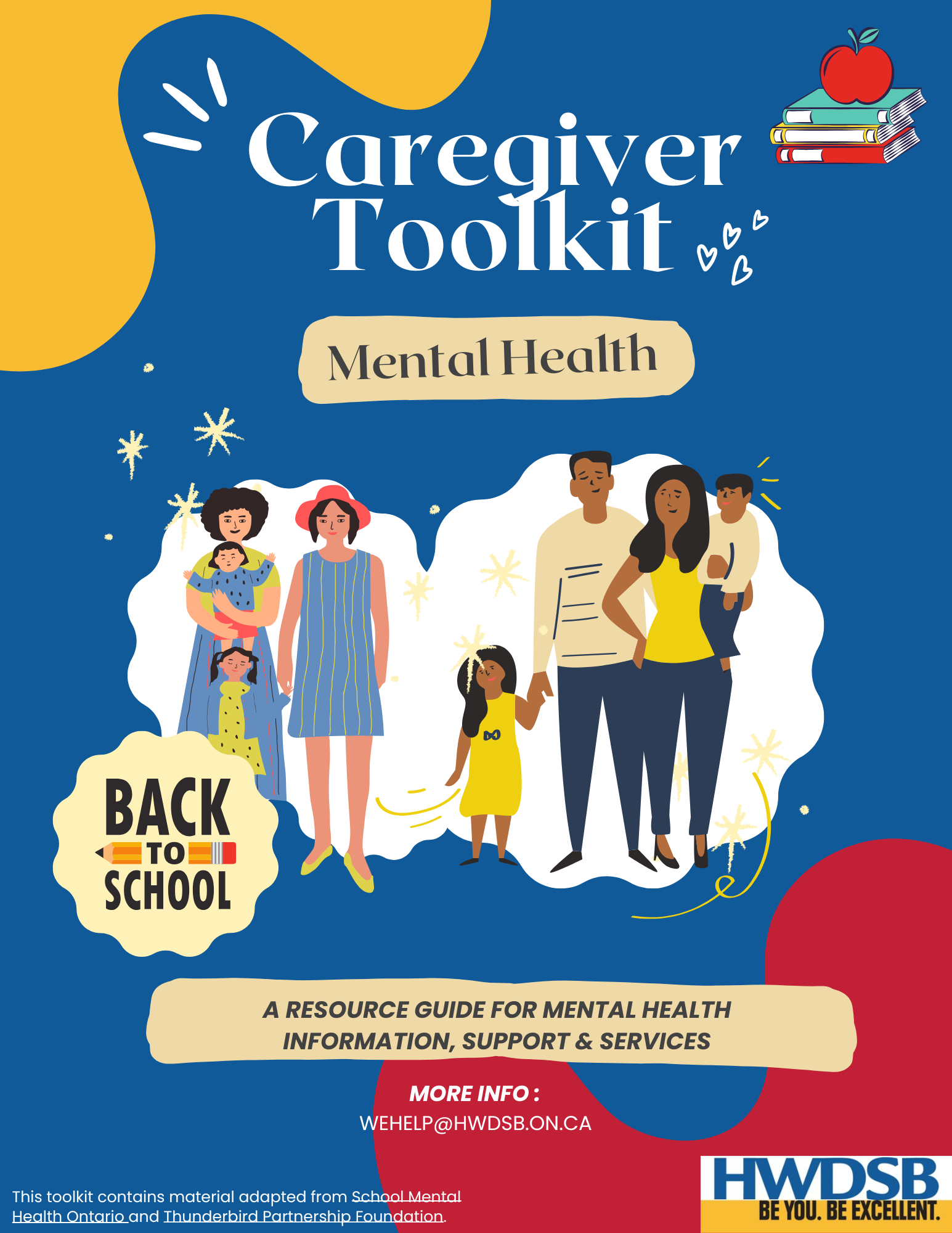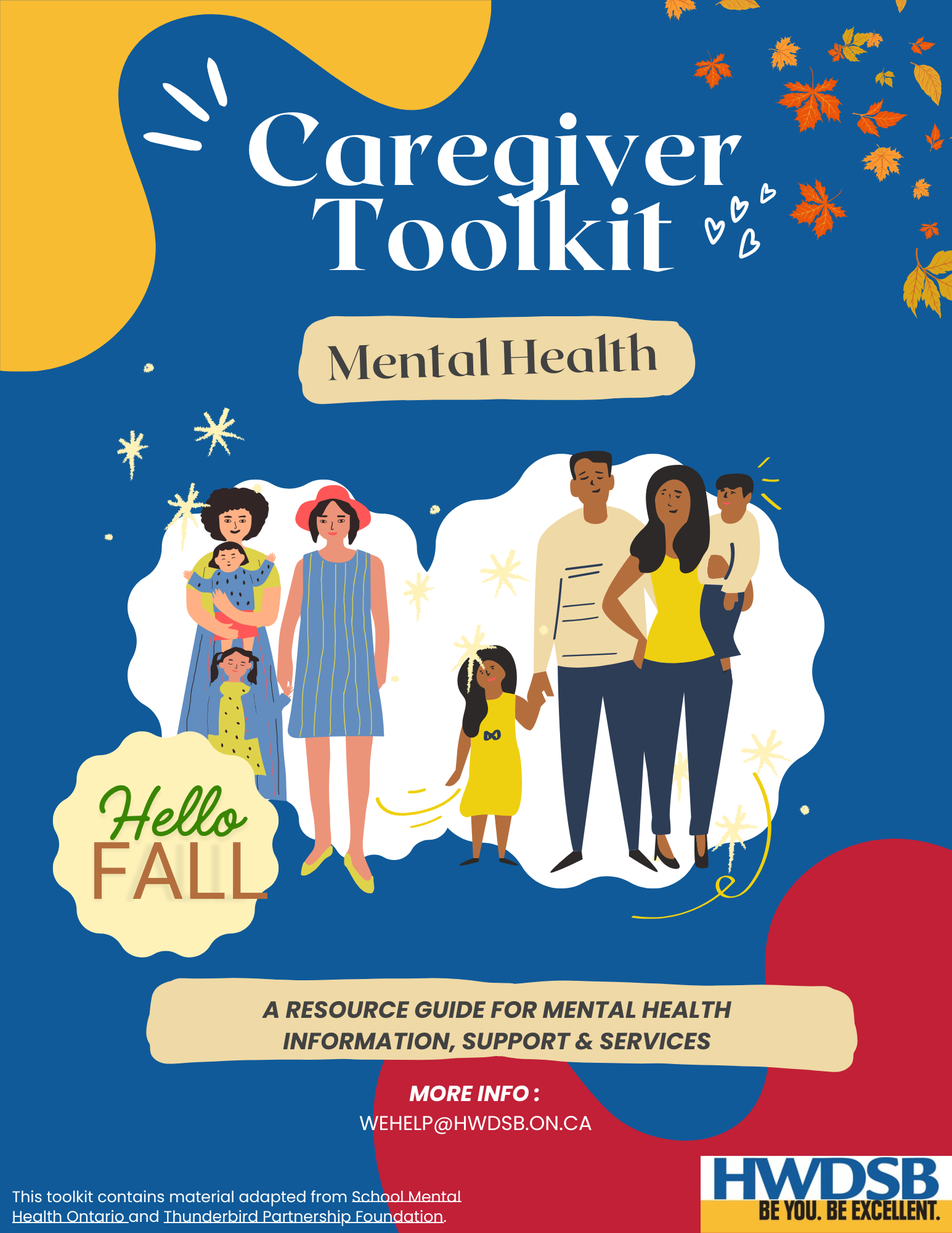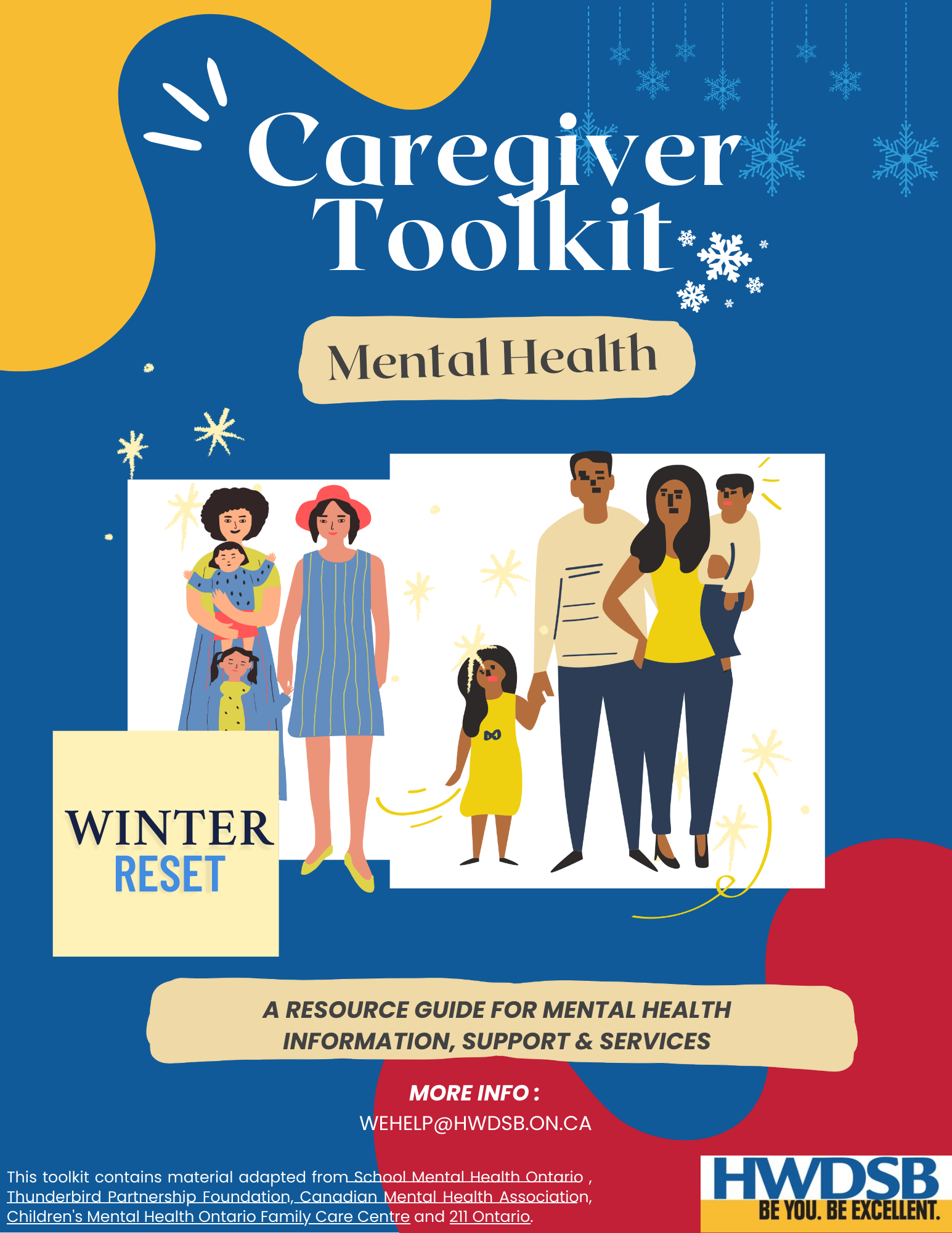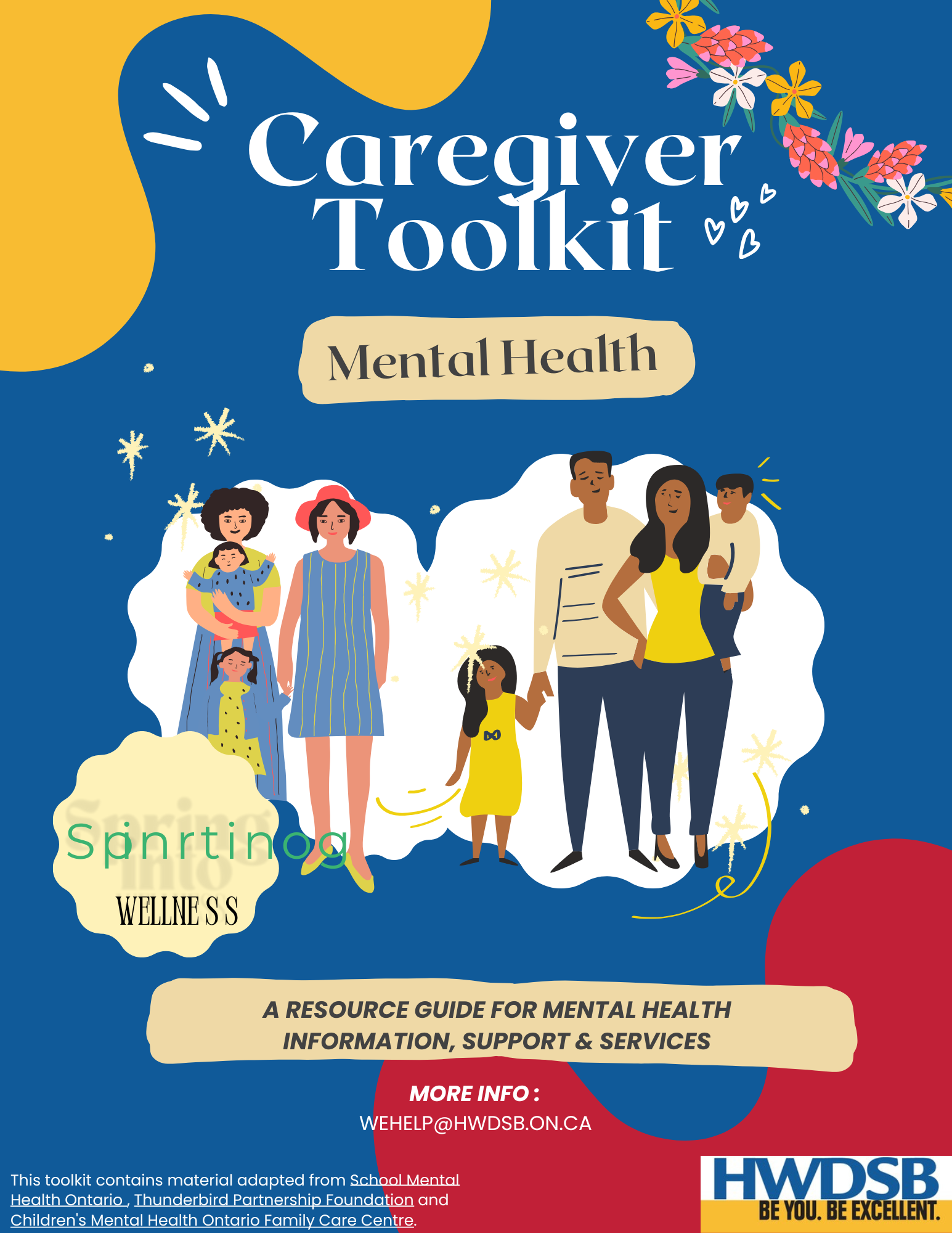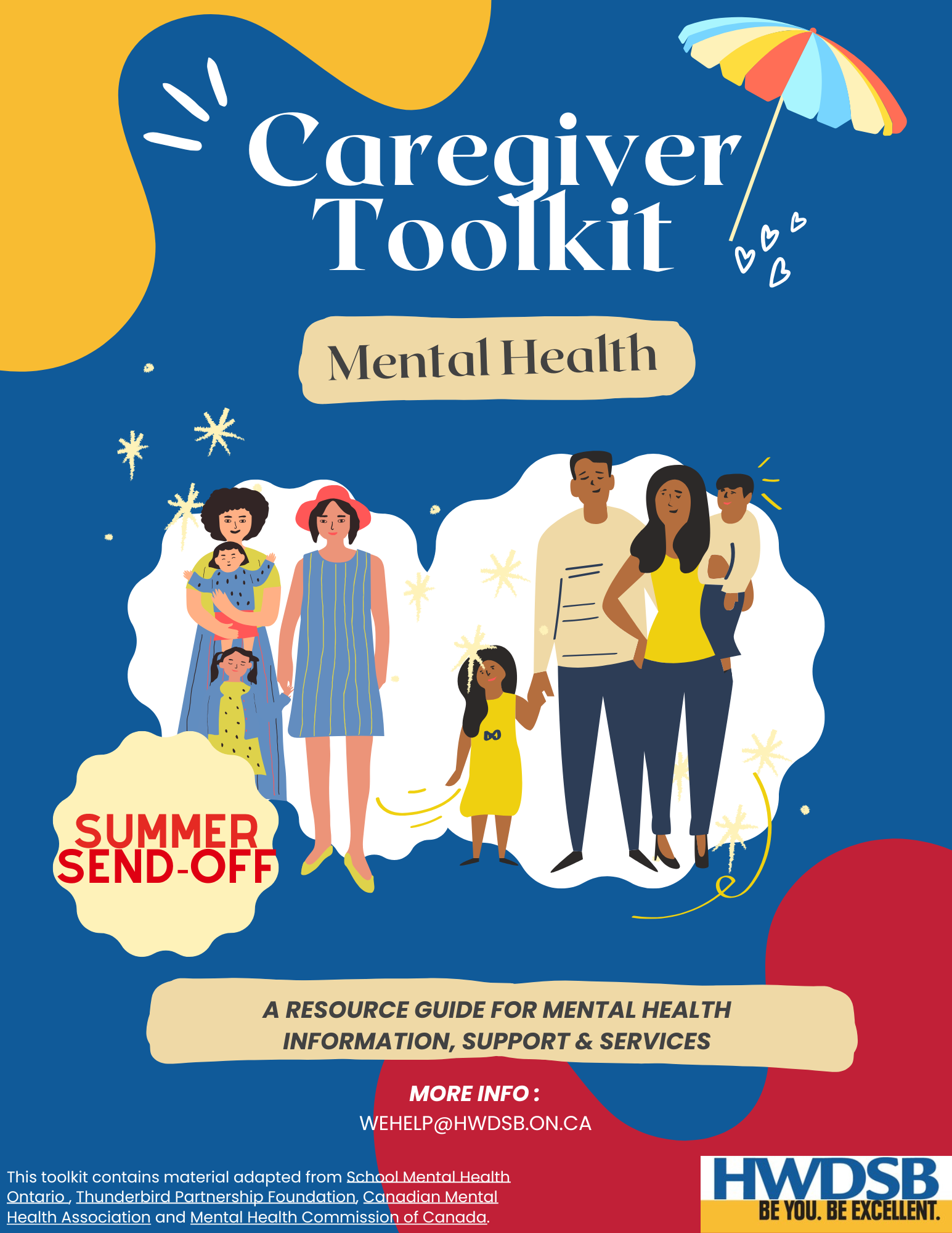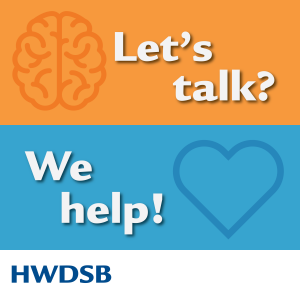
Mental health affects us all – and has real impacts on our lives. At HWDSB, we are committed to supporting the mental health and well-being of all students and staff. We offer various webinars, workshops and treatment groups to students and families over the course of the school year.
- Social Work Services
- Strategy & Action Plans
- Responding to Distressing Events
- Child Abuse Prevention
- Help by Topic
- Emergency Help
Student Mental Health Toolkit

Caregiver Toolkit
We’re excited to introduce the Caregiver Mental Health Toolkit! This toolkit is here to support you with helpful information, practical tips, and trusted resources to help you care for your child’s mental health. At the heart of the toolkit is a caregiver-friendly resource guide, filled with information and details about where to find support—both at school and in the community. Whether you’re looking for guidance, services, or just reassurance, this toolkit is designed to help you feel more confident and connected as you support your child’s wellbeing.
Social Work Services
Happy September! A warm welcome back, we are glad you are here.
Returning to school can be an exciting time for children, youth and families, but it can also be a stressful time. This Back-to-School We Help Update is designed to help make caregivers aware of HWDSB supports available so you can best meet the needs of children.
Explore the links below to learn about various mental health and well-being webinars and groups taking place over the coming weeks. To register, click the links underneath the dates and follow the steps on the page.
Speaking of mental health and well-being, we invite you to watch our back-to-school Director’s Corner video with a special spotlight on wellness. For this edition in the series, elementary students from W.H. Ballard and secondary students from the Healthcare Support Services Specialist High Skills Major (SHSM) program sat down to share thoughts on wellness, mental health and more.
Groups & Workshops for Students
Student Groups
For more information about these groups and how to register for them, please contact the social worker assigned to your child’s school or email [email protected]
Student Anxiety Groups
Student anxiety groups are designed to help children and youth who struggle with moderate symptoms of stress, anxiety, and/or depression by teaching evidence-based cognitive behavioral therapy (CBT) and mindfulness skills.
This is a 10-week program that may be offered virtually and/or in person. It is recommended that caregivers attend either the Emotion Coaching Webinar or The Caregiver’s Toolkit: Managing Anxiety and Depression Webinar to help them decide if this group best meets their child or youth’s needs. HWDSB is offering the following Anxiety groups for Fall 2025, Spring 2026, and *Summer 2026 (pending ministry funding).
Grade 4-6
Fall session: 10 consecutive weeks on Tuesdays from October 14-December 16, 2025
5:00pm – 6:30pm virtually through your child’s Microsoft Teams account. The link will be provided to you.
Spring session: 10 consecutive weeks on Mondays starting Mar. 23, 2026
4:30pm – 6:00pm virtually through your child’s Microsoft Teams account. The link will be provided to you.
Grade 7-8
Fall session: 10 consecutive weeks on Wednesdays from October 15-December 17, 2025
3:00pm – 5:00pm In person
Spring session: 10 consecutive weeks on Thursdays starting Mar. 26 – May 28, 2026
3:00pm – 5:00pm In person
Grades 9-12
Fall session: 10 consecutive weeks on Wednesdays from October 15-December 17, 2025
3:00pm – 5:00pm In person
Spring session: 10 consecutive weeks on Wednesdays starting Mar. 25 – May 27, 2026
3:00pm – 5:00pm In person
Teen Activation Group (TAG)
TAG is a treatment group for youth (grades 9 to 12) struggling with depression and anxiety who are not ready to access other treatment options. The group is based on Cognitive Behaviour Therapy (CBT) and Behaviour Activation Therapy. The goal of the group is to help children and youth to reduce their depressive and anxious symptoms and increase their overall activity level, so they can access other treatment options or so they no longer require treatment.
Fall session: 12 weeks on Tuesdays from October 14- January 13, 2026 (No session during winter break)
3 – 4:30 p.m. offered in person.
Spring session: 12 weeks starting week of March 23rd, dates and times TBD
Skén:Nen Indigenous Youth Wellness Program
Skén:Nen combines traditional methods of wellness with Cognitive Behaviour Therapy (CBT) to care for the wholistic needs of Indigenous youth. This program was created through a Two-Eyed Seeing approach by Indigenous clinicians. It incorporates perspectives of Haudenosaunee and Anishinaabe traditions and values and is based on the teachings of the Good Mind and the Seven Grandfather Teachings. We welcome perspectives and learning from different nations and communities. The program is for youth ages 14-21 who identify as Indigenous to Turtle Island (First Nations, Métis, Inuit) and looking for support with anxiety, low mood, mental health, stress, or cultural identity-related issues on a referral basis.
Once a week for 10 consecutive weeks starting February 12, 2026 to April 23, 2026 (except Mar. 19/26) from 3:00pm to 4:30pm
AFFIRM
AFFIRM Is an eight-session Cognitive-Based Therapy informed treatment group specifically for Two Spirit and LGBTQIA+ youth to develop coping skills for anxiety and stress related to experiences of discrimination as a result of their sexual and gender identities. The goals of AFFIRM are to decrease unhelpful thoughts, feel better about yourself and lives, and to make healthy choices for sexual and mental health.
Click here to find additional help and resources on our Mental-Health and Well-Being page.
Groups & Workshops for Parents and Caregivers
Explore the links below to learn about various mental health and well-being webinars and groups taking place over the coming weeks. To register, click the links underneath the dates and follow the steps on the page.
For more information about these groups, please contact the social worker assigned to your child’s school or email [email protected]
Caregiver Webinars
The Mental Health Toolkit: Managing Anxiety and Low Mood in Children and Youth Webinar
This webinar will help caregivers to better understand anxiety and low mood in Children and Youth and learn practical strategies and tools to support their child in managing their mental health. The webinar will also introduce caregivers to resources available to them and their child at HWDSB should they require additional mental health support beyond what is provided in the workshop.
Fall session: September 24, 2025 – 6:00 – 7:30 p.m.
Click Here to Register
Winter session: November 27, 2025 – 6:00 – 7:30 p.m.
Click Here to Register
Spring session: March 4, 2026 – 6:30 – 8:00pm. Virtual
Click here to register
Emotion Coaching Webinar
Emotion Coaching is a communication strategy that can calm the brain in as little as 60 seconds, and help improve relationships. Emotion Coaching has two steps:
- Validation: Letting someone know we understand why they feel, think or act a certain way.
- Support: Then, we provide emotional and practical support using strategies like reassurance, limit-setting, redirecting, collaborative problem-solving, teaching skills, etc.
Register for the webinar for an introduction to Emotion Coaching and how it can improve relationships. Attendees will learn about the role of emotions, link Emotion Coaching to neuroscience, reviewing Emotion Coaching approaches and more.
Fall session: September 24, 2025 – 6:30 – 8:00 p.m. Virtual
Click Here to Register
Winter session: November 26, 2025 – 6:30 – 8:00pm. Virtual
Click here to register
Spring session: February 2, 2026 – 6:00 – 7:30pm. Virtual
Click here to register
Next session will begin Spring 2026. To be notified of dates and times, please add your name to the pre-registration link here.
From Reaction to Action Webinar
This webinar is designed for parents and caregivers of children in JK through Grade 12 who may be uncertain about how to respond to and support a child experiencing anxiety.
Rather than focusing on the child, this webinar centers on your responses as a primary caregiver. This session will offer information and insights into how shifts in your responses can support your child in managing their anxiety.
Fall session: September 24, 2025 – 4:30-5:30pm. Virtual
Click here to register
Winter session: February 5, 2026 – 6:00-7:00pm. Virtual
Click here to register
Next session will begin Spring 2026. To be notified of dates and times, please add your name to the pre-registration link here.
Caregiver Groups
Families Worrying Less Together Group
This 6-week group is for parents/caregivers who have a child in JK – Gr. 8 who is overly shy or has intense worries and fears that get in the way for them. This program will give you skills which you can use to support your child in learning to overcome their worries and fears. It is recommended that parents & caregivers participate in the Mental Health Toolkit: Managing Anxiety and Low Mood in Children & Youth webinar prior to registering for this group.
Fall session: This virtual group will run weekly on Thursdays, from 4:00 – 6:00 p.m., on Oct. 16, 23, 30, Nov. 6, 13 & 20.
Winter session: This virtual group will run weekly on Thursdays, from 6:30pm – 8:30 p.m., on Jan. 15, 22, 29, Feb. 5, 12, & 19.
Click here to register
Spring session: This virtual group will run weekly on Thursdays, from 6:30pm – 8:30 p.m., on Mar. 26, Apr. 2, 9, 16, 22, & 30.
Click here to register
Emotion Coaching Group
This is a 6-week group for parents and caregivers who would like to learn more about Emotion Coaching. Emotion Coaching is a communication strategy that can calm the brain in as little as 60 seconds and help improve relationships through validation and support. Throughout the group, participants will be introduced to emotion coaching and how it can improve relationships with your loved one, the brain’s connection to emotions, and specific emotion coaching skills related to offering validation and support. It is recommended that parents & caregivers participate in the Emotion Coaching Webinar prior to registering for this group.
Fall sessions: This virtual group will run weekly on Mondays, from 6:30 – 8:30 p.m., on Oct. 20, 27, Nov. 3, 10, 17, & 24.
Click Here to Register
Winter sessions: This virtual group will run weekly on Wednesdays from 6:30 – 8:30pm, on Jan. 7, 14, 21, 28, Feb. 4, & 11.
Click Here to Register **** FULL ****
Spring sessions: This virtual group will run weekly on Mondays from 6:30 – 8:30pm, on on Mar. 30, *** Apr. 6 (no group)***, 13, 20, 27, May 4, & 11.
Click here to register *** FULL ****
Next session will begin Spring 2026. To be notified of dates and times, please add your name to the pre-registration link here.
From Reaction to Action Group
Reaction to Action is a 5-week group for parents & caregivers of children in JK to Grade 12 who notice themselves struggling with knowing how to support their anxious child. This group focuses specifically on the parent/primary caregiver’s behaviour in response to their child’s anxiety. Your child does not need to be ready to make changes themselves. This group is about you and giving you information and skills to change what you do to support your child and their anxiety. It is recommended that parents & caregivers participate in the From Reaction to Action Webinar prior to registering for this group.
Fall session: This virtual group will run weekly on Wednesdays, from 4:30 – 6:30 p.m., on Oct. 15, 22, 29, Nov. 5 & 12.
Click Here to Register
Next session will begin Spring 2026. To be notified of dates and times, please add your name to the pre-registration link here.
Mental Health and Well-Being Action Plan
The HWDSB We Help: Mental Health and Addictions Strategy has prioritized three areas for the 2025-26 Annual Mental Health and Well-Being Action Plan found below.
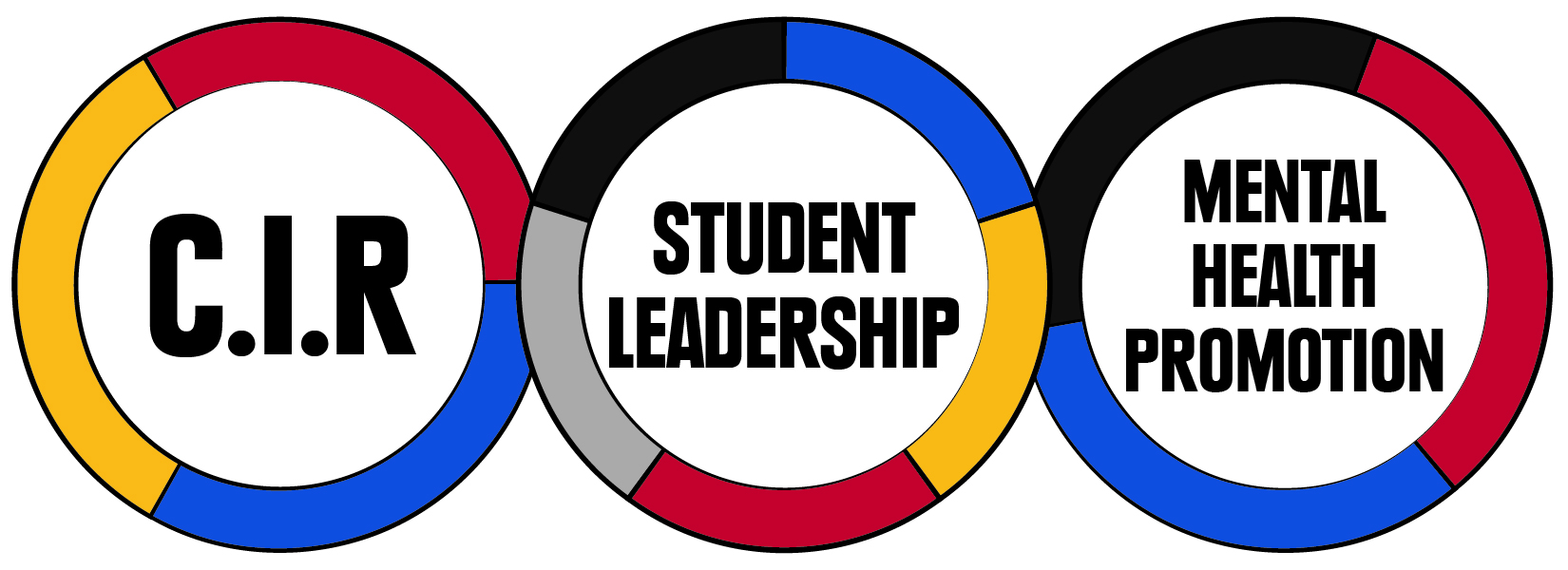
The plan aligns with the goals set out in the HWDSB Board Improvement Plan (BIP) as well as the six key areas of focus outlined in the School Mental Health Ontario (SMHO) 2024-2025 School Mental Health Action Plan (SMHAP). The Annual Mental Health and Well-Being Action Plan also meets or exceeds the expectations set out by the Ministry of Education in Policy/Program Memorandum 169.
Click here to explore the 2025-26 Annual Mental Health and Well-Being Action Plan.
Previous Action Plans: 2024-25 Annual Mental Health and Well-Being Action Plan
We Help: Mental Health and Addiction Strategy 2024-2027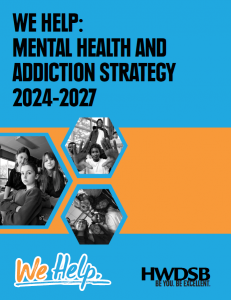
Hamilton-Wentworth District School Board (HWDSB) is committed to supporting positive mental health for every student. The We Help: Mental Health and Addiction Strategy is a comprehensive three-year strategy that organizes and guides the multi-tiered approach to support every student to feel safe and secure in their classrooms and school communities. It meets the expectations outlined from the Ministry of Education Policy/Program Memorandum 169 (PPM169).
Click here to access the full We Help: Mental Health and Addiction Strategy booklet.
As a caring community, we are all shocked and saddened after a distressing event. Challenging events can impact each of us differently. We may feel sadness, grief, helplessness, anxiety and anger. Whatever we feel is okay. When supporting a child or youth, please consider the following points.
Tips for Adults Supporting Challenging Conversations
Take care of your own feelings and needs
- Adults have fears and worries too. It’s important that our feelings do not interfere with listening to children and youth, who must feel that adults are listening, are calm and are in control.
- Take time to deal with your own reactions before speaking to a child or youth. If you are coping well, you can better offer children and youth your support.
- If you are struggling, ask for help. Have someone else support children and youth while you care for yourself.
- School boards can offer specialized support such as social workers and psychologists. Ask your school principal if you wish to speak with someone.
Help children and youth feel safe
- Be calm, offer reassurance and explain how children and youth are in a safe place.
- Limit media consumption, especially in elementary schools. Children struggle to distinguish between TV and reality. Limiting media exposure for older children can keep them from focusing too much on the crisis.
- Discuss conflict resolution ideas and non-violent ways of solving problems.
How can emotion coaching help?
- Emotion Coaching is a communication strategy, which can help to calm the brain, regulate emotions and behaviours, and help children and youth feel heard. It involves two steps: 1) validation and 2)support.
- Validation is an acknowledgement of another’s experience, point of view, thoughts, emotions, or behaviours. Validation requires us to set aside our perceptions while communicating our understanding of their experiences. Validation is proving that you are trying to understand – but from their point of view, as if you were in their shoes.
Acknowledge & validate feelings
- People vary in their emotional responses. Feelings after traumatic events may include fear, loss of control, anger, loss of stability, isolation and confusion.
- Accept these feelings. Allow children and youth to express their feelings. Emphasize that people are entitled to their own feelings and opinions unless it hurts someone else.
- Let them know that their feelings are normal, expected and shared by many others.
- Recognize feelings behind actions and put them into words. For example, “I can see you are feeling scared about this.”
- Encourage children and youth to talk to you or another caring adult. Emphasize that you are there to help, and that they tell an adult if they feel, or a friend feels, overwhelmed.
- Respect diverse responses. Some teens prefer to talk to adults – like parents or teachers – while others prefer to talk to friends.
Be a good listener and observer
- When children or youth ask questions, listen carefully and respond as appropriately and objectively as possible.
- Let them guide you regarding their level of concern or desire for information.
- When answering questions, stick to the facts. Don’t speculate about what could happen. If you don’t know the answer, don’t be afraid to say so.
- Discuss events in terms that are appropriate to a child’s age and level of development.
- You may need to continue discussions. Acknowledge new information as it is available.
Support: respond to changes in behaviour
- Children and youth may respond differently to traumatic events, with forms that may include:
- Preoccupation with violence (e.g. pretending to blow things up)
- Difficulty concentrating
- Aggressive behaviour
- Physical complaints (e.g. stomach aches and headaches)
- Increase in or loss of appetite
- Anxiety, sadness, withdrawal
- Sensitivity to loud noises
- Mood changes
- Sleep disturbances
Identify children and youth who may be at risk
Most children and youth will be able to cope with their concerns about current events, with help from parents, teachers and other caring adults. Some children may be at risk of more extreme reactions due to personal circumstances. The most vulnerable children are those who:
- Can directly relate to the tragic event.
- Have friends or relatives in the affected areas.
- Have experienced a recent death in the family.
- Have a history of depression, anxiety disorders or other trauma.
- Have recently come from a country where they experienced armed conflict.
Keep communication open between home and school
- Be sure to reach out from home to school, and from school to home so that all adults know if a child is experiencing stress at school. Schools have resources that can help.
When to Seek Extra Support for you or your child
Consider reaching out for additional support if:
- If you or your child’s distress lasts more that 2 – 4 weeks.
- Anxiety is interfering with daily life.
- You or they express persistent fear about going to school.
- You or they show withdrawal, nightmares, or major mood changes.
If you have concerns about your child, or youth, help is available:
About Erin’s Law – Bill 123
On December 19, 2024, the Education Act was changed to require each school board to provide information to students, parents/caregivers/guardians and school staff on child sexual abuse prevention and reporting annually. Child Sexual Abuse Prevention and Reporting, (Bill 123- Erin’s Law), 2024.
More information is available at Services and Supports in Hamilton
Student Learning
As part of the Health and Physical Education Curriculum, your child will be participating in a unit on Personal Safety and Injury Prevention, which is part of the Healthy Living strand. This learning meets the Ministry expectations, for children to learn how to recognize and report abuse and unsafe situations.
Parent/Caregiver/Guardian Information and Resources
To support learning at home, we are providing a caregiver resource titled Personal Safety & Healthy Child Development (Ages 6–7). This guide includes information on child development, online safety, and strategies for setting boundaries and having open conversations with your child.
Students will receive annual, age appropriate learning on recognizing, preventing, and reporting child sexual abuse, including how to seek help from a trusted adult.
Link to the Services and Supports in Hamilton
Personal Safety Healthy Child Development – Grade 1 & 2
Personal Safety Healthy Child Development – Grade 3
Personal Safety Healthy Child Development – Grade 4 & 5
Personal Safety Healthy Child Development – Grade 6 & 7
Personal Safety Healthy Child Development – Grade 8
Teachers and Other Board Staff
“We all share a responsibility to protect children from harm. This includes situations where children are abused or neglected in their own homes. Ontario’s Child, Youth and Family Services Act, 2017 (CYFSA) provides for protection for these children. Section 125 of the CYFSA states that the public, including professionals who work with children, must promptly report any suspicions that a child is, or may be, in need of protection to a children’s aid society (society). The CYFSA defines the phrase “child in need of protection” and explains what must be reported to a society. It includes physical, sexual and emotional abuse, neglect, and risk of harm.” Reporting Child Abuse and Neglect: It’s Your Duty – Your responsibilities under the Child, Youth and Family Services Act, 2017
Anxiety, Low Mood & Depression
- Families Worrying Less Together: If you are a parent/primary caregiver of a student in grades JK to 2 or grades 3 to 6 who is excessively shy, or has intense worries and fears, come learn about the “Families Worrying Less Together” program. This program will give you practical strategies to help your child learn to cope differently. Please note: The program is for parents and primary caregivers, children do not attend.
- Teen Activation Group (TAG): TAG is a treatment group for youth (grades 9 to 12) struggling with depression and anxiety who are not ready to access other treatment options. The group is based on Cognitive Behaviour Therapy (CBT) and Behaviour Activation Therapy. The goal of the group is to help child and youth to reduce their depressive and anxious symptoms and increase their overall activity level, so they can access other treatment options or so they no longer require treatment. The group engages in education sessions, as well as social and physical activities. This is an open group and referrals are accepting on an ongoing basis. To access Social Work Services, please contact the Principal/Vice-Principal of your school or (905) 527-5092 ext. 2806.
- TRAILS to Wellness: TRAILS groups are designed to help our children and youth (grades 6 to 12) who struggle with moderate symptoms of stress, anxiety, and/or depression by teaching evidence-based cognitive behavioral therapy (CBT) and mindfulness skills. TRAILS aims to help children and youth develop effective coping skills and strategies to help manage their emotions and choose helpful behaviours. This is a 10-week program that may be offered virtually and/or in person, as public health guidelines allow. Children and youth who might benefit from the group are primarily having difficulty with both anxiety and depressive symptoms/low mood that is impairing their functioning. Children and youth interested in participating should have some awareness of their struggles and would be motivated to improve their coping skills. Parent sessions are also available as part of the program, so that parents have a better understanding of their child’s mood and anxiety difficulties and effective strategies to continue to improve overall wellbeing. This is a closed group, and we are currently accepting applications. To access Social Work Services, please contact the Principal/Vice-Principal of your school or (905) 527-5092 ext. 2806.
- Mental Health and Well-being – Anxiety: This session focuses on increasing participants’ understanding of anxiety. Participants will learn to identify signs and symptoms, understand what they can do to help, and take away some strategies that can be used at home, school, and in the community.
- Mental Health and Well-being – Low Mood: This session focuses on increasing participants’ understanding of low mood and its impact on students’ performance and overall well-being. Participants will gain knowledge about the signs and symptoms associated with low mood, learn how to help, and take away strategies that may be beneficial at home, school, and in the community.
- Anxiety Infolet for Parents
- Anxiety in Kindergarten
- Anxiety in Youth Infolet
- Depression – when it’s more than sadness
Black Communities
- Black Youth Helpline: 1-833-294-8650. Serves all youth and specifically responds to the need for a Black youth specific service, positioned and resourced to promote access to professional, culturally appropriate support for youth, families and schools.
- Black Youth Project: Reminders and affirmations to help Black community members through the pandemic.
- Caribbean African Canadian Social Services: Social services for Black residents, including mental health counselling.
- 8 Mental Health Practices for People of African Descent while Isolated
Child and Youth Sexual Abuse and Assault
Services and Supports in Hamilton for Child and Youth Sexual Abuse and Assault
Sexual Assault Centre of Hamilton (SACHA)
SACHA is a feminist, non-profit, community-based organization that provides supports to people who have experienced sexualized violence at any point in their lives. We work to end violence and oppression through education, advocacy, outreach, coalition building, community partnerships, and activism.
24-hour support line — 905.525.4162
SACHA-What Happens When You Call The Line?
The Sexual Abuse, Assessment and Treatment (SAAT) Program: Lynwood Charlton Centre
The SAAT Program is a specialized mental health program for children and youth who have experienced sexual harm or have demonstrated inappropriate sexual behaviour with other children.
The mission of the CSCHN’s Program Combating Violence Against Women and Sexual Assault is to promote women’s well-being. It is open to all French-speaking women aged 16 or over regardless of their race, religion, origin, culture, age, ability, sexual orientation, socioeconomic status or situation.
Hamilton Service: Toll-free: 1-866-437-7606, Tel: 905-528-0163
Canadian Human Trafficking Hotline
You can reach out 24/7 — whether you’re being trafficked, you know someone who is, or you’re a trafficking survivor. We’ll help you explore options that feel right for you. We are not government or law enforcement. Everything you share is confidential.
Call 1-833-900-1010
Sexual Assault and Domestic Violence Care Centre –Hamilton Health Sciences
The Sexual Assault/Domestic Violence (SA/DV) Care Centre provides compassionate, confidential health care for children, adolescents, women, transgender persons, and men who have experienced sexual assault and/or domestic violence. Our mission is to ensure that care is provided with sensitivity and privacy for survivors of sexual assault and domestic violence.
For anyone 13 years of age or over:
- Juravinski Hospital & Cancer Centre emergency department
- Hamilton General Hospital emergency department
For children and youth 17 and under:
- McMaster Children’s Hospital emergency department
Note: We do not report assault cases to police. If you wish to file a police report for sexual assault or domestic violence, we can provide support to you if requested.
Call: (905) 521 – 2100 ext. 73557
CHILD PROTECTION SERVICES
Hamilton Catholic Children’s Aid Society
Guided by Catholic values and teachings, we serve and offer bilingual (English/French) services to children, youth, and families within the Hamilton community to protect their safety and well-being, strengthen families and nurture lifelong relationships.
905-525-2012 or After-Hours Emergency Services (905) 522-8053 or In French 1-855-550-3571
Hamilton Child and Family Supports
Hamilton Child and Family Supports has a legal mandate to promote the best interests, protection, and well-being of children and youth. Interventions by HCFS staff involve working with families with a focus on child safety while providing support to families to promote and strengthen their ability to keep children and youth safe.
905-522-1121 or After-Hours Emergency Services (905) 522-8053 or In French 1-855-550-3571
Distressing Events
- As a caring community, we are all shocked and saddened after a tragic event. These rare events can impact each of us differently. We may feel sadness, grief, helplessness, anxiety and anger. Whatever we feel is okay. When supporting a child or youth, please consider the following points.
Drop-in Counselling
- Catholic Family Services – Various counselling, including walk-in and support programs available to the Hamilton community. (905) 527-3823; com
- Youth Wellness Centre (age 17+) – Drop in counselling Wednesdays 1-5:30 p.m. at Child and Adolescent Services, 100 Main Street East, Suite 220. Ask for Peter from the Youth Wellness Centre at Reception on Thursdays 8:30-11:30 a.m. at 38 James St. S., Hamilton.
Eating Disorders
- Please contact your Family Doctor.
- Hamilton Health Sciences: Eating Disorder Program.
- Hamilton Family Health Team: Eating Disorders.
Emotional Regulation
Emotion Coaching is a communication strategy that can calm the brain in as little as 60 seconds, and help improve relationships. Emotion Coaching has two steps:
- VALIDATION: Letting someone know we understand why they feel, think or act a certain way.
- SUPPORT: Then, we provide emotional and practical support using strategies like reassurance, limit-setting, redirecting, collaborative problem-solving, teaching skills, etc.
Learn more:
- PDF Flyer: Emotion Coaching for Parents-Caregivers Spring 2022
- Parent/Caregiver Cheat Sheet: Emotion Coaching Cheat Sheet for Parents and Caregivers
- Video: Learn more about Emotion Coaching at HWDSB
Executive Functioning
Free online programs
- Internet-Based Cognitive Behavioural Therapy (iCBT) available through MindBeacon or Morneau Shepell: free online cognitive behavioural therapy to develop skills and strategies to address symptoms of mild to moderate anxiety and/or depression. Online support by a therapist.
- BounceBack: 1-866-345-0224. Free program that provides guided mental health self-help supports for those above age 15 using workbooks, online videos and phone coaching.
- Big White Wall: an anonymous online community where members can support each other 24 hours a day, 365 days a year.
- Wellness Together Canada portal: free online resources, tools, apps and connections to trained volunteers and qualified mental health professionals
- Anxiety Canada
Leader in developing free online, self-help, and evidence-based resources on anxiety. - Your Space Hamilton: Place for youth and families looking for mental health information and supports in Hamilton, Ontario.
General Mental Health
- Your Family Doctor’s Office
- CONTACT Hamilton – Single access point for children and youth (age 18 and under) requiring service for social-emotional, behavioural, developmental and/or mental health needs. (905) 570-8888; contacthamilton.ca
- Child and Adolescent Services: 905 546 2424. Children’s mental health program offered by the City of Hamilton to provide health assessment and treatment for children and youth, under 18, and their families.
- Youth Wellness Centre – Mental health and addiction programs and support available to individuals aged 17-25. Clients can self-refer. (905) 522-1155 x 31725 or email [email protected] ; 38 James St S, Hamilton, ON L8P 4W6
- De dwa da dehs nye>s (Aboriginal Health Centre) – Provide mental wellness services that are culturally safe for all members of the urban community who self-identify as having Aboriginal ancestry. 678 Main Street East (905) 544-4320
- School Mental Health Assist – provincial implementation support team helping Ontario school boards promote student mental health and well-being.
- Quick Facts for Parents about Mental Health – Ministry of Education overview for parents.
- No Problem Too Big or Too Small: Student Help-Seeking Resource
- SMHO – How to Support a Mentally Healthy Back to School for Your Child (Available in 34 languages)
- SMHO With Care – Tip sheet for Parents and Caregivers
- SMHO Info Sheet – Noticing Mental Health Concerns for Your Child
- Mental Health and Well-being – Creating a Mentally-Healthy Home: This session is intended to help parents and caregivers understand factors related to the mental health and well-being of children and adolescents at home and at school. This session will provide a foundation of common language related to mental health, the importance of early recognition of mental health concerns, and factors that promote well-being. Their will be a discussion of strategies that parents and caregivers can use to support the mental health and well-being of children and youth in their care. To register or seek further information about any mental health and well-being workshop, please contact [email protected]
- HWDSB – Community Supports and Mental Health Resources for Students
- HWDSB – Community Supports and Mental Health Resources for Parents and Caregivers
Gender-based Violence
If you would like to speak to someone about your situation and/or require a safety plan to leave your home, please call one of the following Gender-based Violence Shelters:
Inasmuch House
- 24-Hour Crisis Line: 905-529-8600
- Text: 289-212-6399
Interval
- 24-Hour Crisis Line: 905-387-9959
Martha House
- 24-Hour Crisis Line: 905.523.6277
Native Women’s Centre
- 24-Hour Crisis Line: 905-977-0234
Here are some additional resources for those who may need support:
Assaulted Women’s Helpline
- 1-866-863-0511 (multilingual services available)
- TTY 1-866-863-7868
Fem’aid Helpline (French Only)
- 1-877-336-2433
- TTY: 1-866-860-7082
Indigenous Service Canada (ISC) Health and Cultural Support Services for Survivors, Family Members and Those Affected by MMIWG
- Those affected by the issue of missing and murdered Indigenous women and girls are able to access mental health counselling, emotional support, and community-based cultural support services. The service is available in English, French, Cree, Anishinaabemowin (Ojibway) and Inuktitut.
- https://www.rcaanc-cirnac.gc.ca/eng/1548700698392/1548701361628
- 1-888-301-6426
Nise Homes
- Transitional home for Muslim, immigrant and/or refugee women and their children. Services are offered in English, French, Arabic, Punjabi, Farsi and Somali.
- Contact: 1(888)456.8043 EXT. 410
- [email protected]
Talk4Healing Helpline for Indigenous Women
- 1-855-554-4325
Sexual Assault Centre of Hamilton (SACHA)
SACHA is a feminist, non-profit, community-based organization that provides supports to people who have experienced sexualized violence at any point in their lives. We work to end violence and oppression through education, advocacy, outreach, coalition building, community partnerships, and activism.
24-hour support line — 905.525.4162
SACHA-What Happens When You Call The Line?
Women Abuse Working Group
In Hamilton, there are sexual assault services that offer a variety of support for individuals who have experienced recent or historical sexual violence. The Women Abuse Working Group (WAWG) has created the video below to share and raise awareness of the supports available in our city: Sexual Assault Services & Resources in Hamilton (2022)
In Hamilton, there are gender-based violence shelters that offer temporary housing and a variety of supports for individuals who have experienced violence. The Women Abuse Working Group (WAWG) has created the video below to share and raise awareness of the supports available in our city: Violence Against Women Shelters & Services in Hamilton (2023)
Grief & Loss
- Bereaved Families of Ontario Hamilton/Burlington
- (905) 318-0070
- 118 – 293 Wellington St. N. Hamilton Ontario L8L 8E7
- The Children’s Grief Foundation
- A comprehensive guide to accessing supports anywhere in Canada, including resources for parents and school staff.
- Lighthouse for Grieving Children and Families
- My Grief
- Modules for the bereaved to help move through the grief.
- Kids Grief / Youth Grief
- Modules for parents and educators.
- Youth grief is specific to teens and their experiences of grief.
- Friends in Grief
- Support for bereaved adults (18 years of age and older).
- (905) 318-0059
- Canadian Alliance for Children’s Grief
- COAST
- Crisis team connected to a variety of local mental health and social service agencies.
- (905) 972-8338
- Hamilton Wentworth Police Victim’s Services
- This service provides voluntary care, intervention and supportive counselling, emotional and psychological support, information and community referrals if required, to all victims of crime and circumstances at the scene of an incident.
- (905) 546-4904
- Bob Kemp Hospice
- Offering a range of programs to help support adults, children, youth and families on their grief journeys.
- Kemp Care Network
- 905-387-2448
- 277 Stone Church Road East Hamilton, ON L9B 1B1
Housing
- Notre Dame House: An emergency shelter for homeless or street- involved youth age 16-21. (905) 308-8090
- Youth Reconnect: For youth ages 13-19 at risk of homelessness or with a history of housing instability. 905-308-8090
Indigenous People
- Mental Health Support for Indigenous Students –from School Mental Health Ontario site
- De dwa da dehs ny (Aboriginal Health Centre): 905 544 4320. Improving the health and well-being of Indigenous individuals, families and communities through holistic Indigenous, Traditional and Western health care.
- Hamilton Regional Indian Centre: 905 548-9593. To provide the Urban Aboriginal People with the tools to achieve a balanced holistic lifestyle
- Indigenous Call Centre: 905 549 4884, ext. 416. Niwasa Kendaaswin Teg culturally safe call centre that connects Indigenous residents in Hamilton to resources such as food supports and mental health supports.
- Hope for Wellness Helpline: 1-855-242-3310. Immediate mental health counselling and crisis intervention for Indigenous peoples by calling or using live web chat.
- Talk 4 Healing: 1-855-554-4325. 24/7 support and resources for Indigenous women in 14 languages by calling or texting.
- Mental Health & Wellness Tips: The Assembly of First Nations resources and tips for mental health and wellness during COVID-19.
- Indian Residential School Survivors and Family: 1-800-721-0066. The Indian Residential Schools Crisis Line is available 24-hours a day for anyone. experiencing pain or distress as a result of their Residential school experience.
Muslim Communities
- Naseeha Mental Health Hotline: 1 (866) 627-3342. Mental Health workshops, web therapy sessions, and texting mental health support 5 days a week for Muslim and non-Muslims.
Newcomers, Immigrants and Refugees
People with Specialized Needs
- Autism Spectrum Disorder (ASD) and Mental Health: Autism Spectrum Disorder (ASD) is a lifelong neurodevelopmental disorder that affects the way a person communicates and relates to people and the world around them. It is a wide range or spectrum of conditions characterized by challenges with speech and nonverbal communication, social skills, and repetitive behaviors, and can cause significant communication, social, and behavioural challenges, placing children and teens with autism at an increased risk for mental health concerns. Join us to discuss the unique challenges faced by individuals with autism, and strategies that can help to increase their calm. Autism and Mental Health infolet
- CNIB: free virtual programs for those who are blind or partially sighted, their families, friends and caregivers.
- Canadian Association of Community Living: COVID-19 mental health resources for those with disabilities.
- Developmental Disabilities and Mental Health: Children and teens with developmental delays often have difficulty communicating their needs and often experience long periods of heightened stress trying to keep up with the fast pace of the world around them. Join us to discuss the unique challenges faced by individuals with developmental disabilities and mental health concerns (often referred to as dual diagnosis) and learn strategies that may help to increase their calm. Developmental Disabilities and Mental Health infolet.
- Health Care Access, Research, and Developmental Disabilities (HCARDD): virtual mental health supports for people with developmental disabilities and their families.
- The Gifted Learner and Mental Health: Being a student with a gifted learning profile brings with it potential pros (learning at an advanced pace, opportunity to extend their learning) but also potential cons (not always sharing the same interests with same aged peers, heightened expectations). Being identified as having a gifted learning profile does not necessarily place students at a higher risk for mental health challenges, but it can place them at a unique risk for concerns such as anxiety, depression, and perfectionism. Join us to discuss the unique challenges faced by students with a gifted profile and learn strategies that can help to increase their calm. Gifted and Mental Health infolet
- Learning Disability and Mental Health: Children and teens living with Learning Disabilities (LD) often experience feelings of inadequacy, frustration, and anxiety because their efforts at school may not result in the same grades and recognition as their peers, despite having average range intellectual skills. Not only do these feelings of failure and frustration, as well as difficulty processing information inherent in learning disabilities, make learning and navigating social relationships even harder, they can also place children at increased risk of experiencing mental health concerns. Learning Disabilities and Mental Health infolet.
- Mental Health and Well-being – Attention Deficit Hyperactivity Disorder: This session focuses specifically on ADHD (inattentive type, hyperactive type and combined type). Research regarding the onset and neurobiology of ADHD will be presented. Other difficulties commonly associated with, or resulting from, ADHD will be addressed. Effective strategies that parents and caregivers can use in the home will be discussed. ADHD Parent infolet
Sexual Health
For Parents
Sex Positive Families
Sex Positive Families provides the education and resources that help families raise sexually healthy children: https://sexpositivefamilies.com/
Digital Birds and Bees
The digital birds and bees takes a look at online platforms and digital well-being to help mental health professionals, parents and kids understand the risks and benefits of sexual education on the internet: https://digitalbirdsandbees.com/
For Youth
Hamilton Sexual Health Clinics
Sexual Health Clinics provide many services including testing for sexually transmitted infections, pregnancy tests and birth control. There are four locations across Hamilton. To find the closest one to you visit, www.hamilton.ca/people-programs/public-health/sexual-health/sexual-health-clinics or call the info line 905-528-5894.
The Sexual Health Infoline Ontario (SHILO)
A free, anonymous and inclusive eChat and phone service for Ontario residents. This service is staffed by counsellors who provide information, support and referrals in English, French and other languages on sexual health topics. Find more information at sexualhealthontario.ca or call Toll-free: 1-800-668-2437
Every Body Curious
Every Body Curious is an entertaining and educational YouTube series about sexuality and healthy relationships for youth, ages 9-12: https://everybodycurious.com/
Teen Health Source
Teen Health Source is a sexual health information service run for and by youth. Whether teens need information about birth control, sexually transmitted infections, healthy relationships, or puberty, we provide information in a non-judgmental, sex-positive, pro-choice, and inclusive manner: https://teenhealthsource.com/
Sex Talks
Sex Talks is a series of one-hour workshops, over six consecutive weeks, about sexual health and relationships designed for people 16+ who have a developmental and/or physical disability: https://eafwr.on.ca/training/sex-talks/
Substance Misuse
- Alternatives for Youth: 905-527-4469. Substance use and addiction treatment services for youth and their families by phone.
- Alcohol, Drugs, and Gambling Services Hamilton: 905-546-3606. For information, counselling and programs on alcohol, drugs and gambling. Alcohol and drug programs are for people ages 23 + and gambling program for those age 12+. Family and friends can also call for information and support.
- Cannabis: What Parents/Guardians and Caregivers Need to Know
Staff Wellness
Staff well-being is important to us at HWDSB. You can visit our intranet Staff Wellness page to discover resources and services available to support you in your wellness journey. We are continuously striving to meet the needs of our diverse community here at HWDSB and aim to build a program that will actively eliminate barriers, foster and maintain a culture of human rights, and hold space for every identity that we serve.
All staff (including casual and non-union) as well as their dependents have access to free and confidential services through Homewood Health, our Employee and Family Assistance Provider (EFAP). You can access Homewood by calling the 24-hour toll-free access number at 1-800-663-1142 or online by visiting homeweb.ca.
If you have any questions or need support in accessing Homewood Health resources, or if you have any suggestions on how Staff Wellness can further assist you, please don’t hesitate to get in touch with [email protected]
Two Spirit and LGBTQiA+ Communities
- AFFIRM: Is an eight-session Cognitive-Based Therapy informed treatment group specifically for Two Spirit and LGBTQIA+ youth to develop coping skills for anxiety and stress related to experiences of discrimination related to their sexual and gender identities. The goals of AFFIRM are to decrease unhelpful thoughts, feel better about yourself and lives, and to make healthy choices for sexual and mental health. Please contact [email protected] if you have any questions.
- Speqtrum
- LGBT Youth Line: peer support to LGBT youth, age 29 and under. Text and online chat.
- Trans Lifeline Hotline: 1-877-330-6366. Peer support phone service run by trans people for our trans and questioning peers.
- Tips for Supporting Yourself as a 2SLGBTQI+ Student
Didn’t find what you were looking for?
- Red Book Community Information by Hamilton Public Library provides trusted, up-to-date information about social services and community resources for residents of Hamilton. (905) 528-8127 or 211. Email [email protected] for more information.
Emergency Help
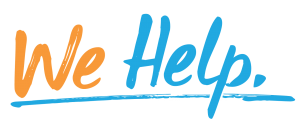
COAST Hamilton
Mental health crisis outreach and support for all ages.
Crisis Line (905) 972-8338; coasthamilton.ca
Kids Help Phone
24/7 counselling and information service for young people.
Crisis Line 1-800-668-6868; kidshelpphone.ca
McMaster Children’s Hospital: Child and Youth Mental Health Emergency Services (CHYMES)
McMaster Located within the emergency department for youth age 17 and younger.
1200 Main St W, Hamilton, ON L8N 3Z5
Sexual Assault Centre of Hamilton (SACHA) – Crisis Line (905) 525-4162 sacha.ca (for 16+ only)
Call 911
Updated on Thursday, June 13, 2024.


